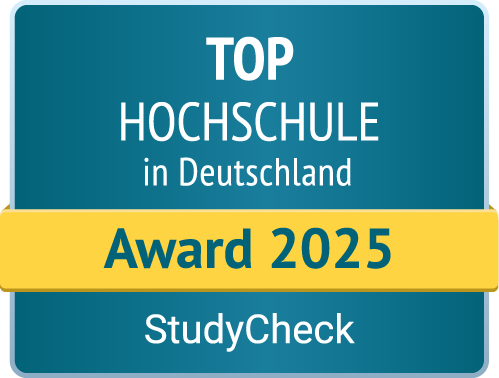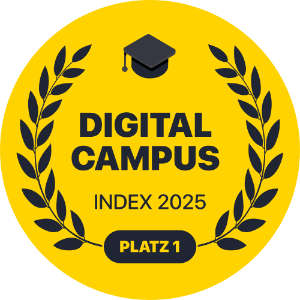Faculty of Engineering
Biomedical Engineering (BMT)

Study overview
In Biomedical Engineering, devices, systems and/or software are developed to support modern medicine. The Bachelor's programme in Biomedical Engineering was first offered in the winter semester 2009/10 and is the first independent course in (bio)medical engineering at universities of applied sciences in Bavaria. The course is interdisciplinary and practice-oriented: It covers the basics of natural and engineering sciences, diagnostic and therapeutic issues in medicine, but also some elements of business administration and important legal aspects. The educational goals are: knowledge and methodology of the engineering sciences, understanding of medical diagnostic and therapeutic issues, basic principles of medical working methods taking into account economic aspects, the interaction of technical systems with the human body and the safety aspects of medical technology.
| Short form | BMT |
| Type of study | Full time |
| Standard period of study | 7 semester |
| Award | Bachelor of Engineering (B.Eng.) |
| Start of studies | Winter semester |
| Admission restrictions | None |
| Lecture location | Ansbach |
| Language of instruction | German |
| Course management | Prof. Dr. Roland Schnurpfeil |
| Student advisory service | Prof. Tanja Schmidt |
| Student Services | studierendenservice.bmt(at)hs-ansbach.de |
Study structure
The programme lasts seven semesters and consists of 23 modules. The individual modules are awarded credit points (ECTS) and comprise a total of 210 credit points.
If the modules are grouped thematically, the following schematic study structure results:
Some facts about the study programme and the chronological overview:
- Length of study: 7 semesters
- Coursework: 23 modules (210 ECTS)
- Attendance hours: 140 SWS, of which
- 89 SWS seminar-based teaching and
- 51 SWS exercises and laboratory practicals
- Practical semester: 23 ECTS
- Bachelor thesis: 12 ECTS
Laboratories

Imaging techniques

Bioprocess Engineering

Biomechanics and Rehabilitation

Biosignal processing

Biotechnology / Biotechnikum

Chemistry

Data Processing / Design

Electrical engineering
Metrology

Physics

Physics of medical devices

Materials engineering BMT / IBT

Simulation / Data processing
Further Information
Graduates with a bachelor’s degree in Biomedical Engineering can choose to work in wide variety of fields
- Research and Development
- Planning and operation
- Project planning, construction and manufacturing
- Service provision, Sales and Marketing
for equipment and systems in the bio-medical sector
Career paths
Amongst potential employers are research institutions and companies from the medical technology industry. More than 250 companies with more than 20,000 employees in the medical field are located in the Nuremberg metropolitan region alone.
Owing to the continuing high demand for products and solutions in this field, Biomedical Engineering is predicted to grow rapidly, both in Germany and throughout Europe. This due to current demographic developments and health-care reforms in Europe which are placing high demands on equipment etc. and the introduction of higher medical standards, particularly in Asia.

Internships in Biomechanics
Some Internships take place at Ansbach Hospital or in medical technology companies. For example, part of the biomechanics internship is held at the world market leader for osteosynthesis products in Switzerland. Here, whilst "screwing, drilling and sawing" bones, you will learn about various methods for fracture treatment in the context of a trauma workshop, attended by many surgeons during their training.
Further training events and study trips
In addition to the medical-technical advanced training events, which are held every semester at our university and at which company representatives present their products and technologies, we offer several study trips to medical technology companies in the region and beyond. Every year we visit MEDICA, the world's largest medical technology trade fair in Düsseldorf with our third semester students.
Michael B.
Bachelor studies "Biomedical Engineering
"Friendly people and close supportive relationships in the study groups and seminars due to small groups", "I enjoyed the numerous internships and excursions."
Ann-Kathrin G.
Bachelor's programme ‘Biomedical Engineering’
"nice, friendly, family atmosphere at Ansbach University", "very good supervision", "good relationships between teachers and students",
"practical, often unique internships", "exciting project work, such as setting up internship experiments."
Claudia M.
Bachelor's programme ‘Biomedical Engineering’
"good supervision by professors", "good relationships between lecturers and students", "internship at Ansbach Hospital", "all the internships were really interesting and instructive"
Bernd Ö.
Master studies "Applied Research and Development" at the Ansbach University of Applied Sciences
"The special feature of the course is its great practical relevance. There is an exercise or a laboratory practical for almost every lecture, so you can immediately apply the theoretical knowledge you have learnt and extend it further. The highlight of the course is the practical internship at Ansbach Hospital."
Bernd Ö.
Master studies "Applied Research and Development" at the Ansbach University of Applied Sciences
"The special feature of the course is its great practical relevance. So there is to almost every lecture an exercise or a laboratory internship, and you can immediately use the theoretical knowledge you have learned, and thus also further deepen. The highlight is the hospital internship at the Ansbach Hospital. There one learns in ten different the use of the respective diagnostic or therapy systems, and sees what requirements the equipment has to meet. to be able to deliver the best possible result for the patient. A further advantage of the study programme is the very personal Contact to professors and laboratory engineers. This ensures optimal individual support in the day-to-day study routine as well as in the laboratory internships. guaranteed. Due to the very broad and practice-oriented content of the course of studies, one is well prepared for everyday professional life as well as for the following Master's program very well prepared."
Staff

Aysel Aksungur-Sallanbas
Laboringenieurin Biomedizinische Technik (BMT)
0981 4877-386 51.1.6 nach Vereinbarung a.aksungur-sallanbas vCard
Aysel Aksungur-Sallanbas

Laboringenieurin Biomedizinische Technik (BMT)
Funktionen:
- Laboringenieurin Biomedizinische Technik (BMT)

Prof. Dr. Andreas Boger
Professor Biomedizinische Technik (BMT)
Prof. Dr. Andreas Boger

Professor Biomedizinische Technik (BMT)
Funktionen:
- Professor Biomedizinische Technik (BMT)
- Studiendekan Fakultät Technik
Lehrgebiete:
- Materialwissenschaften
- Maschinenbau
- Biomaterialien
- Biomechanik

Joshua Früh
Labortechniker Biomedizinische Technik (BMT)
0981 4877-327 92.1.45 nach telefonischer Vereinbarung joshua.frueh vCard
Joshua Früh

Labortechniker Biomedizinische Technik (BMT)
Funktionen:
- Labortechniker Biomedizinische Technik (BMT)

Dipl.-Ing. (FH) Tobias Graef, M.Eng.
Laboringenieur Biomedizinische Technik (BMT)
Dipl.-Ing. (FH) Tobias Graef, M.Eng.

Laboringenieur Biomedizinische Technik (BMT)
Funktionen:
- Laboringenieur Biomedizinische Technik (BMT)

Celina Nachtrab
Fakultätsassistentin Fakultät Technik
0981 4877-171 92.2.43 nach Vereinbarung celina.nachtrab vCard
Celina Nachtrab

Fakultätsassistentin Fakultät Technik
Funktionen:
Fakultätsassistentin Fakultät Technik
Betreute Studiengänge:
Applied Biotechnology (ABI)
Biomedizinische Technik (BMT)
Industrielle Biotechnologie (IBT)
Künstliche Intelligenz und Kognitive Systeme (KIK)
Media Systems Engineering (MSE)

Prof. Tanja Schmidt
Professorin Biomedizinische Technik (BMT) / Studienfachberatung Biomedizinische Technik (BMT)
0981 4877-308 51.2.19 Montag12.00-13.00 Uhr, nach Vereinbarung tanja.schmidt vCard
Prof. Tanja Schmidt

Professorin Biomedizinische Technik (BMT) / Studienfachberatung Biomedizinische Technik (BMT)
Funktionen:
- Professorin Biomedizinische Technik (BMT)
- Studienfachberatung Biomedizinische Technik (BMT)
- Mitglied Senat
- Frauenbeaufragte
Lehrgebiete:
- Anatomie und Physiologie
- Diagnosesysteme
- Therapiesysteme
- Medizinproduktegesetz
- Statistik

Prof. Dr. rer. nat. Roland Schnurpfeil
Studiengangsleiter Biomedizinische Technik (BMT)
0981 4877-518 51.2.21 nach Vereinbarung (Ruf doch mal an!) roland.schnurpfeil vCard
Prof. Dr. rer. nat. Roland Schnurpfeil

Studiengangsleiter Biomedizinische Technik (BMT)
Funktionen:
- Studiengangsleiter Biomedizinische Technik (BMT)
- Professor Public Relations und Unternehmenskommunikation (PUK)
Lehrgebiete:
- Spezielle Betriebswirtschaftslehre
- Marketing
- Produktmanagement
- Gesundheitswesen und -ökonomie
- Projekt- & Qualitätsmanagement
- Vertrieb medizinischer Güter

Prof. Dr.-Ing. Martin Schönegg
Professor Biomedizinische Technik (BMT) / Praktikumsbauftragter Biomedizinische Technik (BMT)
0981 4877-255 51.1.5 nach Vereinbarung martin.schoenegg vCard
Prof. Dr.-Ing. Martin Schönegg

Professor Biomedizinische Technik (BMT) / Praktikumsbauftragter Biomedizinische Technik (BMT)
Funktionen:
- Professor Biomedizinische Technik (BMT)
- Praktikumsbauftragter Biomedizinische Technik (BMT)
- Professor Künstliche Intelligenz und kognitive Systeme (KIK)
Lehrgebiete:
- Elektronik
- Medizinische Messtechnik
- Biosignalverarbeitung

Prof. Dr. rer. nat. Dr.-Ing. habil. Michael Thoms
Professor Biomedizinische Technik (BMT)
0981 4877-250 51.2.3 Montag 9.30-10.30 Uhr & nach Vereinbarung michael.thoms vCard
Prof. Dr. rer. nat. Dr.-Ing. habil. Michael Thoms

Professor Biomedizinische Technik (BMT)
Funktionen:
- Professor Biomedizinische Technik (BMT)
Lehrgebiete:
- Biomedizinische Technik
- Physik
- Medizintechnik
- Werkstoffwissenschaften
- Mathematik

Prof. Dr. Christian Uhl
Professor Biomedizinische Technik (BMT) / Vorsitzender Prüfungskommission Biomedizinische Technik (BMT)
Prof. Dr. Christian Uhl

Professor Biomedizinische Technik (BMT) / Vorsitzender Prüfungskommission Biomedizinische Technik (BMT)
Funktionen:
- Studiengangsleiter Applied Research in Engineering Sciences (APR)
- Professor Biomedizinische Technik (BMT)
- Studienfachberatung Applied Research in Engineering Sciences (APR)
- Vorsitzender Prüfungskommission Biomedizinische Technik (BMT)
- Leiter Kompetenzzentrum Center for Signal Analysis of Complex Systems (CCS)
Lehrgebiete:
- Angewandte Mathematik
- Signal- und Datenverarbeitung
Vita:
- Studium: Physik-Studium an der Universität Stuttgart und der University of Oregon
- Promotion: Institut für Theoretische Physik und Synergetik der Universität Stuttgart im Bereich der raum-zeitlichen Signalverarbeitung
- Industrie- und Forschungstätigkeiten: Medizinische Bild- und Signalverarbeitung am Max-Planck-Institut für Neuropsychologische Forschung in Leipzig, Automatische Spracherkennung in den Philips GmbH Forschungslaboratorien in Aachen
- seit 2001: Professor an der Hochschule Ansbach
- WS 2008/09 & WS 2011/12: Gastaufenthalte am Department of Biomedical Engineering der University of California Irvine
Publikationen:

Cornelia Zapf
Mitarbeiterin Bereich Studierendenservice
0981 4877-572 54.1.10 nach Vereinbarung studierendenservice.bmt / studierendenservice.ibt / studierendenservice.kik / studierendenservice.niw vCard
Cornelia Zapf

0981 4877-572
54.1.10
nach Vereinbarung
studierendenservice.bmt / studierendenservice.ibt / studierendenservice.kik / studierendenservice.niw
vCard
Mitarbeiterin Bereich Studierendenservice
Funktionen:
- Mitarbeiterin Bereich Studierendenservice
Betreute Studiengänge
- Biomedizinische Technik (BMT)
- Industrielle Biotechnologie (IBT)
- Künstliche Intelligenz und Kognitive Systeme (KIK)
- Nachhaltige Ingenieurwissenschaften (NIW)
© 2025 Hochschule Ansbach




